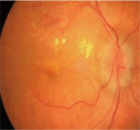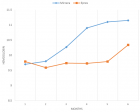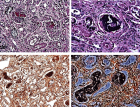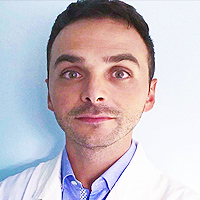Abstract
Research Article
Staff experiences of the REFOCUS intervention to support recovery in mental health: A qualitative study nested within a cluster randomized controlled trial
M Leamy*, R Macpherson, G Riley, K Sanger, E Clarke, V Bird, M Janosik, H Jordan, C Le Boutillier, J Williams and M Slade
Published: 27 April, 2020 | Volume 4 - Issue 1 | Pages: 024-032
Background: The REFOCUS intervention was a whole team, complex intervention, designed to increase the recovery support offered by community based, mental health staff. The intervention consisted of two components: Recovery promoting relationships, which focused on how staff work with service users, and Recovery working practices, which focused on what activities and tasks staff and service users could do together.
Aim: We aimed to investigate the experiences of community mental health workers using the REFOCUS intervention to support personal recovery.
Method: In the context of the REFOCUS Trial (ISRCTN02507940), 28 semi-structured individual interviews and 4 staff focus groups, with 24 participants were conducted and thematically analyzed.
Results: Staff valued coaching training and used coaching skills to have tough as well as empowering, motivational conversations with service users. They were positive about the resources within the ‘working practices’ intervention component. The whole team training and reflection sessions helped create team cultures, structures and processes which were conducive to supporting recovery practice.
Conclusion: We recommend the wider use of coaching skills, strengths-based assessments, and approaches to support clinicians to broaden their understanding of service users’ values, treatment preferences and to support striving towards personally-meaningful goals. Staff who used these working practices changed their beliefs about what their service users were capable of, and became more hopeful practitioners. A team-based approach to support recovery creates a learning environment in which staff can support and challenge one another, making sustained practice change more likely.
Read Full Article HTML DOI: 10.29328/journal.apmh.1001014 Cite this Article Read Full Article PDF
Keywords:
Recovery; Complex interventions; Process evaluation; Psychosis; Cluster randomized controlled trial; Staff experiences; REFOCUS
References
- Bonney S, Stickley T. Recovery and mental health: A Review of the British Literature. J Psychiatr Ment Health Nurs. 2005; 15: 140-153. PubMed: https://www.ncbi.nlm.nih.gov/pubmed/18211561
- Everett B, Adams B, Johnson J, Kurzawara G, Quigley M, et al. Recovery rediscovered: Implications for the Ontario mentla health system. In: Association CMH, editor.: Ontario Division; 2003.
- Australian Health Ministers’ Advisory Council. A national framework for recovery-oriented mental health services: Policy and Theory. In: ageing DoHa, editor.: Commonwealth of Australia; 2013.
- Anthony W. Recovery from Mental Illness: The Guiding Vision of the Mental Health Service System in the 1990s. Psych Rehab J. 1993;16: 11-23.
- Farkas M, Gagne C, Anthony W, Chamberlin J. Implementing Recovery oriented evidence based programs: Identifying the Critical Dimensions. Community Ment Health J. 2005; 41: 141 - 158. PubMed: https://www.ncbi.nlm.nih.gov/pubmed/15974495
- Davidson L, Rowe M, Tondora J. A Practical Guide to Recovery-Oriented Practice: Tools for Transforming Mental Health Care USA: Oxford University Press; 2008.
- Le Boutillier C, Slade M, Lawrence V, Bird V, Chandler R, et al. Competing Priorities: staff perspectives on supporting recovery. Administration and Policy in Mental Health and Mental Health Services Research. in press.
- Slade M, Amering M, Farkas M, Hamilton B, O'Hagan M, et al. Uses and abuses of recovery: implementing recovery-oriented practices in mental health systems. World Psychiatry. 2014; 13: 12-20. PubMed: https://www.ncbi.nlm.nih.gov/pubmed/24497237
- Gilburt H, Slade M, Bird V, Oduola S, T. C. Promoting recovery-oriented practice in mental health services: a quasi-experimental mixed-methods study. BMC Psychiatry. 2013; 13: 167. PubMed: https://www.ncbi.nlm.nih.gov/pubmed/23764121
- Repper J, Perkins R. Social Inclusion and Recovery: An Approach for Mental Health Practice: Balliere-Tindall; 2003.
- Rapp C, Goschka R. The Strengths model: Case Management for People with Psychiatric Disabilities. 2nd ed. Oxford: Oxford University Press; 2006.
- Slade M, Bird V, Le Boutillier C, Williams J, McCrone P, et al. The REFOCUS Trial: A cluster randomised controlled trial of a pro-recovery intervention within community based mental health teams. 2011; 11: 185. PubMed: https://www.ncbi.nlm.nih.gov/pubmed/22112008
- Bird V, Leamy M, Le Boutillier C, Williams J, Slade M. REFOCUS: promoting recovery in community mental health services. 2011.
- Le Boutillier C, Leamy M, Bird V, Davidson L, Williams J, et al. What does recovery mean in practice? A qualitative analysis of international recovery-oriented practice guidance. Psychiatr Serv. 2011; 62: 1470-1476. PubMed: https://www.ncbi.nlm.nih.gov/pubmed/22193795
- Leamy M, Bird V, Le Boutillier C, Williams J, Slade M. Conceptual framework for personal recovery in mental health: systematic review and narrative synthesis. Br J Psychiatry. 2011; 199: 445-452. PubMed: https://www.ncbi.nlm.nih.gov/pubmed/22130746
- Bird V, Leamy M, Tew J, Le Boutillier C, Williams J, et al. Fit for purpose? Validation of the conceptual framework of personal recovery with current mental health service users. Aust N Z J Psychiatry. in press.
- Slade M, Leamy M, Bacon F, Janosik M, Le Boutillier C, et al. International differences in understanding recovery: systematic review. Epidemiol Psychiatr Sci. 2012; 21: 353-364. PubMed: https://www.ncbi.nlm.nih.gov/pubmed/22794507
- Bird V, Le Boutillier C, Leamy M, Larsen J, Oades L, et al. Assessing the strengths of mental health service users - systematic review. Psychol Assess. 2012; 24: 1024-1033. PubMed: https://www.ncbi.nlm.nih.gov/pubmed/22708573
- Shanks V, Williams J, Leamy M, Bird V, Le Boutillier C, et al. Measures of personal recovery: systematic review. Psychiatr Serv. 2013; 64: 974-980. PubMed: https://www.ncbi.nlm.nih.gov/pubmed/23820592
- Williams J, Leamy M, Bird V, Harding C, Larsen J, et al. Measures of the recovery orientation of mental health services: systematic review. Soc Psychiatry Psychiatr Epidemiol. 2012; 47: 1827-1835. PubMed: https://www.ncbi.nlm.nih.gov/pubmed/22322983
- Grant A, Treweek S, Dreischulte T, Foy R, Guthrie B. Process evaluations for cluster-randomised trials of complex interventions: a proposed framework for design and reporting. Trials. 2013; 14: 15. PubMed: https://www.ncbi.nlm.nih.gov/pubmed/23311722
- Leamy M, Clarke E, Le Boutillier C, Bird V, Janosik M, et al. Implementing a manualised intervention to support personal recovery: a qualitative study nested within a Cluster Randomised Controlled Trial. PLoS One. 2014; 9: e97091. PubMed: https://www.ncbi.nlm.nih.gov/pubmed/24875748
- Slade M, Bird V, Chandler R, Fox J, Larsen J, et al. The contribution of advisory committees and public involvement to large studies: case study. BMC Health Serv Res. 2010; 10: 323. PubMed: https://www.ncbi.nlm.nih.gov/pubmed/21126353
- Braun V, Clarke V. Using thematic analysis in psychology. Qualitative Res Psycho. 2006; 3: 34.
- Hungerford C, Kench P. The perceptions of health professionals of the implementation of Recovery-oriented health services: A case study analysis. J Mental Health Training, Education and Practice. 2013; 8: 208 - 218.
- Piat M, Lai S. Service Providers’ Experiences and Perspectives on Recovery- Oriented Mental Health System Reform. Psychiatr Rehabil J. 2012; 35: 289–296. PubMed: https://www.ncbi.nlm.nih.gov/pubmed/22491368
- Tickle A, Brown D, Hayward M. Can we risk recovery? Agrounded theory of clinical psychologists’ perceptions of risk and recoveryoriented mental health services. Psychol Psychother.. 2014; 87: 96–110. PubMed: https://www.ncbi.nlm.nih.gov/pubmed/24497399
- Courtney M, Moulding N. Beyond Balancing Competing Needs: Embedding Involuntary Treatment Within a Recovery Approach to Mental Health Social Work. Aus Soc Work. 2013.
- Felton BJ, Barr A, Clark G, Tsemberis SJ. ACT Team Members’ Responses to Training in Recovery-Oriented Practices. Psychiatr Rehabil J. 2006; 30: 112-119. PubMed: https://www.ncbi.nlm.nih.gov/pubmed/17076054
- Cleary M, Horsfall J, O'Hara-Aarons M, Hunt GE. Mental health nurses’ views of recovery within an acute setting. Int J Ment Health Nurs. 2013; 22: 205–212. PubMed: https://www.ncbi.nlm.nih.gov/pubmed/22882297
- Bora R, Leaning S, Moores A, Roberts G. Life coaching for mental health recovery: the emerging practice of recovery coaching. Advances in Psychiatric Treatment. 2010; 16: 459-467.
- Sullivan P, Floyd D. Spirit Lifting: Hope and Recovery in Case Management Practice. Families in Society: J Contemporary Social Serv. 2013; 94: 38.
- Slade M, Bird V, Clarke E, Le Boutillier C, McCrone P, et al. Supporting recovery in patients with psychosis using adult mental health teams (REFOCUS): a multi-site cluster randomised controlled trial. Lancet Psychiatry. 2015; 2: 503-514. PubMed: https://www.ncbi.nlm.nih.gov/pubmed/26360446
- Macpherson R, Pesola F, Leamy M, Bird V, Le Boutillier C, et al. The relationship between clinical and recovery dimensions of outcome in mental health. Schizophr Res. 2016 175, 1-3, 142-147. PubMed: https://www.ncbi.nlm.nih.gov/pubmed/26527245
- Wallace G, Bird V, Leamy M, Bacon F, Janosik M, et al. Service user experience of the REFOCUS intervention. Soc Psychiatry Psychiatr Epidemiol. 2016; 51: 1275-1284. PubMed: https://www.ncbi.nlm.nih.gov/pubmed/27365099
- Meadows G, Brophy L, Shawyer F, Enticott J, Fossey E, et al. REFOCUS-PULSAR recovery-oriented practice training in specialist mental health care: a stepped-wedge cluster randomised controlled trial. Lancet Psychiatry. 2019; 6: 103-114.
- Shawyer F, Enticott J, Brophy L, Bruxner A, Fossey E, et al. The PULSAR Specialist Care protocol: a stepped-wedge cluster randomized control trial a training intervention for community mental health teams in recovery-oriented practice. BMC Psychiatry. 2017; 17: 172. PubMed: https://www.ncbi.nlm.nih.gov/pubmed/28482829
Similar Articles
-
Staff experiences of the REFOCUS intervention to support recovery in mental health: A qualitative study nested within a cluster randomized controlled trialM Leamy*,R Macpherson,G Riley,K Sanger,E Clarke,V Bird,M Janosik,H Jordan,C Le Boutillier,J Williams,M Slade. Staff experiences of the REFOCUS intervention to support recovery in mental health: A qualitative study nested within a cluster randomized controlled trial. . 2020 doi: 10.29328/journal.apmh.1001014; 4: 024-032
-
The surrey county lunatic asylum-an overview of some of the first admissions in 1863-1867Ruckshana Azeez*,Claire Veldmeijer,Paul Lomax,Aileen O’Brien. The surrey county lunatic asylum-an overview of some of the first admissions in 1863-1867. . 2022 doi: 10.29328/journal.apmh.1001039; 6: 023-028
-
Schizoaffective Disorder in an Individual with Mowat-Wilson Syndrome (MWS)Yadwinder Chuhan, Nimrit Bath, Muhammad Ayub*. Schizoaffective Disorder in an Individual with Mowat-Wilson Syndrome (MWS). . 2024 doi: 10.29328/journal.apmh.1001050; 8: 008-011
Recently Viewed
-
The efficacy of complex Decongestive Physiotherapy in patients with Bilateral Primary Lower Extremity Lymphedema and Untreatable multiple health conditions: A Case ReportHümeyra Kiloatar PT*. The efficacy of complex Decongestive Physiotherapy in patients with Bilateral Primary Lower Extremity Lymphedema and Untreatable multiple health conditions: A Case Report. J Nov Physiother Rehabil. 2017: doi: 10.29328/journal.jnpr.1001011; 1: 093-098
-
Cystoid Macular Oedema Secondary to Bimatoprost in a Patient with Primary Open Angle GlaucomaKonstantinos Kyratzoglou*,Katie Morton. Cystoid Macular Oedema Secondary to Bimatoprost in a Patient with Primary Open Angle Glaucoma. Int J Clin Exp Ophthalmol. 2025: doi: 10.29328/journal.ijceo.1001059; 9: 001-003
-
Metastatic Brain Melanoma: A Rare Case with Review of LiteratureNeha Singh,Gaurav Raj,Akshay Kumar,Deepak Kumar Singh,Shivansh Dixit,Kaustubh Gupta*. Metastatic Brain Melanoma: A Rare Case with Review of Literature. J Radiol Oncol. 2025: doi: ; 9: 050-053
-
Depression as a civilization-deformed adaptation and defence mechanismBohdan Wasilewski*,Olha Yourtsenyuk,Eugene Egan. Depression as a civilization-deformed adaptation and defence mechanism. Insights Depress Anxiety. 2020: doi: 10.29328/journal.ida.1001013; 4: 008-011
-
Drinking-water Quality Assessment in Selective Schools from the Mount LebanonWalaa Diab, Mona Farhat, Marwa Rammal, Chaden Moussa Haidar*, Ali Yaacoub, Alaa Hamzeh. Drinking-water Quality Assessment in Selective Schools from the Mount Lebanon. Ann Civil Environ Eng. 2024: doi: 10.29328/journal.acee.1001061; 8: 018-024
Most Viewed
-
Evaluation of Biostimulants Based on Recovered Protein Hydrolysates from Animal By-products as Plant Growth EnhancersH Pérez-Aguilar*, M Lacruz-Asaro, F Arán-Ais. Evaluation of Biostimulants Based on Recovered Protein Hydrolysates from Animal By-products as Plant Growth Enhancers. J Plant Sci Phytopathol. 2023 doi: 10.29328/journal.jpsp.1001104; 7: 042-047
-
Sinonasal Myxoma Extending into the Orbit in a 4-Year Old: A Case PresentationJulian A Purrinos*, Ramzi Younis. Sinonasal Myxoma Extending into the Orbit in a 4-Year Old: A Case Presentation. Arch Case Rep. 2024 doi: 10.29328/journal.acr.1001099; 8: 075-077
-
Feasibility study of magnetic sensing for detecting single-neuron action potentialsDenis Tonini,Kai Wu,Renata Saha,Jian-Ping Wang*. Feasibility study of magnetic sensing for detecting single-neuron action potentials. Ann Biomed Sci Eng. 2022 doi: 10.29328/journal.abse.1001018; 6: 019-029
-
Pediatric Dysgerminoma: Unveiling a Rare Ovarian TumorFaten Limaiem*, Khalil Saffar, Ahmed Halouani. Pediatric Dysgerminoma: Unveiling a Rare Ovarian Tumor. Arch Case Rep. 2024 doi: 10.29328/journal.acr.1001087; 8: 010-013
-
Physical activity can change the physiological and psychological circumstances during COVID-19 pandemic: A narrative reviewKhashayar Maroufi*. Physical activity can change the physiological and psychological circumstances during COVID-19 pandemic: A narrative review. J Sports Med Ther. 2021 doi: 10.29328/journal.jsmt.1001051; 6: 001-007

HSPI: We're glad you're here. Please click "create a new Query" if you are a new visitor to our website and need further information from us.
If you are already a member of our network and need to keep track of any developments regarding a question you have already submitted, click "take me to my Query."
















































































































































